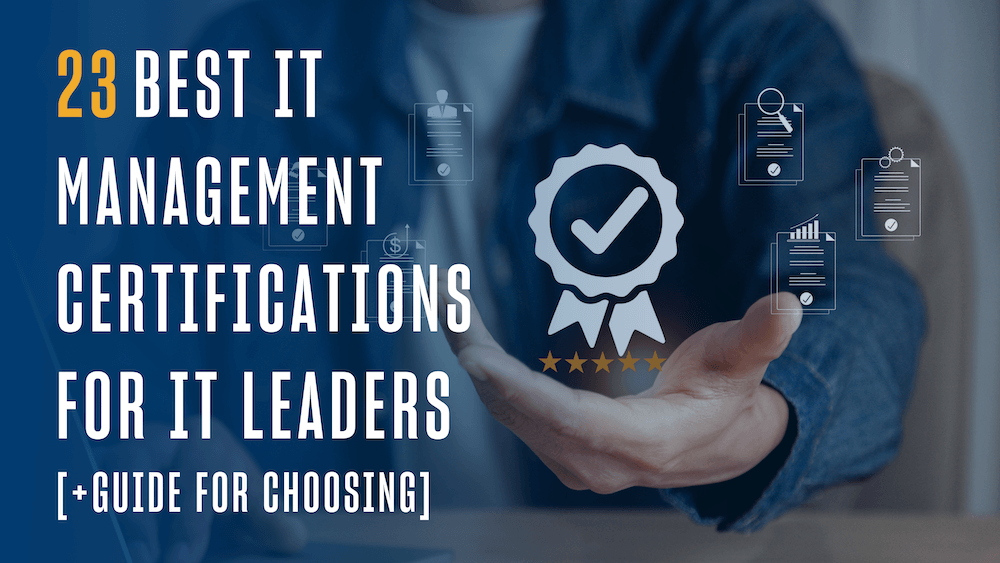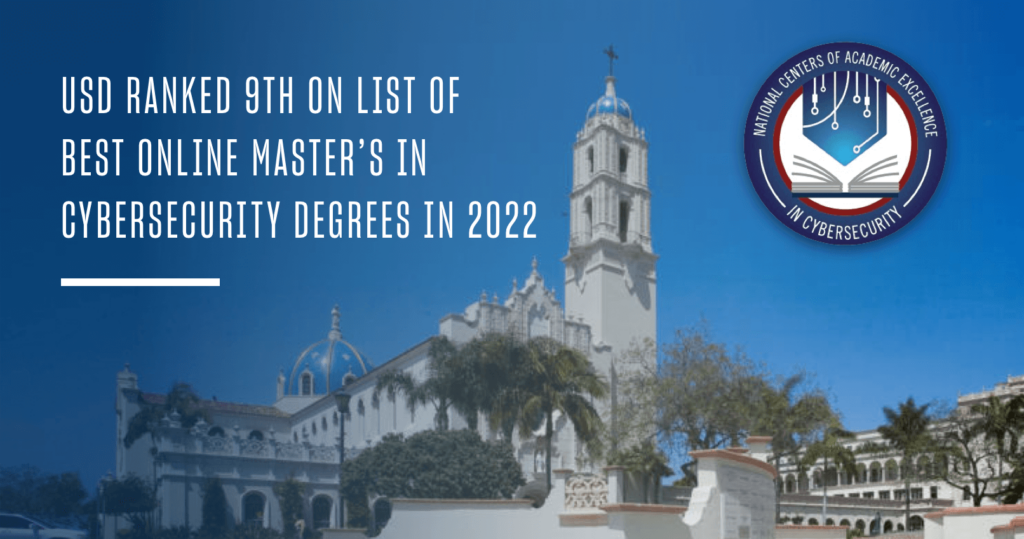As our reliance on technology continues to grow, the need for competent, experienced IT leaders is more pressing than ever. According to research conducted by Christian & Timbers, demand for top-tier tech leaders is expected to surge by 34% within 2023 alone, particularly in software development and reaching up to the echelons of CEO and Board levels. This indicates a promising future for individuals pursuing a career in IT leadership.
In the ever-evolving tech industry, one of the most effective ways for aspiring IT leaders to stay ahead of the curve, enhance their credibility and validate their skills is by pursuing IT leadership certifications. Not only do these certifications showcase a professional’s commitment to continual learning, but they also demonstrate a thorough understanding of complex IT principles and concepts.
In this guide, we’ll examine the benefits of IT leadership and management certifications, identify the roles that stand to gain the most from these qualifications and offer advice on choosing the right certifications for your career goals. Read on as we explore the best IT management certification programs to accelerate your career.
8 Reasons to Pursue IT Management Certifications
As an IT professional seeking to enhance your career prospects, pursuing IT leadership and management certifications can offer numerous benefits. Let’s explore how obtaining an IT management certification can shape your career trajectory:
- Enhancing credibility and authority: An IT leadership certification is a testament to your technical prowess, enhancing your professional credibility. It demonstrates your dedication to mastering IT leadership skills and is a clear indicator of your ability to perform at a high level.
- Gaining a competitive edge in the job market: With the IT field becoming increasingly competitive, an IT manager certification can provide you with a crucial edge. It signifies to potential employers that you have up-to-date skills and knowledge, making you a more attractive candidate for top positions.
- Keeping pace with evolving technology trends: The tech world is in constant flux, with new technologies, tools and practices emerging regularly. IT manager certifications keep you abreast of these changes, equipping you with the skills to implement the latest technology trends.
- Easier to build a case for promotions: Certifications for IT managers substantiate your professional development and competency. This makes it easier to build a compelling case when seeking promotions or salary increases.
- More access to networking opportunities: Obtaining IT director certifications often involves participating in workshops, training sessions, and conferences. These platforms provide networking opportunities with industry peers and thought leaders, fostering valuable professional relationships.
- Proven ROI: While obtaining the best IT management certification requires a significant investment of time and resources, the benefits, including potential salary increases and expanded job opportunities, offer a substantial return on investment (ROI).
For example, Forbes reports that a recent survey conducted by the Project Management Institute found that “professionals with PMI certifications earned salaries that were 16% higher than those who were not certified.”
Furthermore, CIO reports provides another example: “The ITIL 4 certification can increase your earning power in several positions. Those in relevant positions using ITIL 4 earn an average annual salary of $99,000 per year, according to data from PayScale.” - Personal and professional fulfillment: Beyond career advantages, obtaining an IT management certification can provide a sense of personal and professional fulfillment. It is a tangible achievement that demonstrates your commitment to continued learning and professional growth.
- Meeting professional or corporate requirements: Many organizations require their IT leaders to hold specific certifications as proof of their ability to manage complex IT issues effectively. Thus, gaining these certifications helps you meet corporate requirements and standards.
[RELATED RESOURCE] Considering a master’s degree alongside certifications? Make sure you ask these essential questions first.
Careers Benefiting from IT Leadership & Management Certifications
IT manager certifications are not just for those in management roles. They are equally beneficial for various IT professionals, from systems analysts to database administrators, seeking to move up the career ladder. Here, we identify some roles that can significantly benefit from such certifications:
- Chief technology officer (CTO) and AI CTO: These roles require a deep understanding of both business and technology, making certifications a significant advantage. They help CTOs stay updated on the latest technology trends and enhance their ability to align tech strategies with business objectives.
- Chief information officer (CIO): IT management certifications can equip CIOs with the necessary skills to manage information systems effectively and drive digital transformation within their organizations.
- Audit committee director: Certifications provide audit committee directors with insights into IT governance and compliance, strengthening their ability to oversee IT audits effectively.
- Chief demand officer: IT management and leadership certifications can enhance a chief demand officer’s capacity to forecast technology needs and manage IT demand effectively.
- IT manager/director: An IT manager certification can provide the skills needed to lead tech teams, manage IT projects and ensure the smooth operation of IT infrastructure.
- Systems analyst: Certifications can broaden a systems analyst’s understanding of technology systems and their alignment with business requirements.
- Database administrator: Certifications can enhance a database administrator’s knowledge of database technologies and best practices, leading to improved database performance and security.
- Network administrator: Through IT leadership certifications, network administrators can gain insights into network management and security, facilitating better network design and operation.
- Site reliability engineer (SRE): Certifications provide SREs with advanced system reliability and scalability knowledge, enhancing their ability to ensure system uptime and efficiency.
23 Recommended IT Leadership & Management Certifications
Selecting the right IT management certification is pivotal in reaching your career goals. This section outlines some of the top certifications in the field, chosen based on their popularity, industry recognition and value-add to IT professionals’ skill sets. They range from entry-level to advanced certifications and cover a variety of IT disciplines.
Entry-Level Certifications
These are ideal for those starting in IT management or seeking to broaden their understanding of IT principles and practices.
- CompTIA Network+ establishes the essential knowledge of networking concepts.
- CompTIA Project+ offers a broad understanding of project management principles.
- Certified Associate in Project Management (CAPM) validates understanding of the fundamental knowledge, terminology and processes of effective project management.
- COBIT 5 Foundation offers a comprehensive understanding of the COBIT 5 framework for IT governance and management.
- Information Technology Management and Leadership Professional (ITMLP) is for IT professionals looking to acquire a basic level of leadership skills.
Intermediate Certifications
These are perfect for IT professionals seeking to build upon their foundational skills and move into leadership roles.
- Project Management Professional (PMP) is recognized globally and validates your ability to manage projects effectively.
- Certified Information Systems Auditor (CISA) demonstrates your knowledge and skills in auditing, controlling and assurance of business IT systems.
- Information Technology Infrastructure Library (ITIL) focuses on IT service management best practices.
- Certified ScrumMaster (CSM) validates your understanding of the Scrum methodology and your role as a Scrum Master.
- Certified IT Manager (CITM) signifies that you have the skills necessary for a managerial role in IT.
- AMA Certified Professional in Management demonstrates management and leadership potential.
Advanced Certifications
These are aimed at IT professionals who have significant experience in their fields and are looking for leadership or specialized roles.
- Certified Information Systems Security Professional (CISSP) is recognized globally for its standard of achievement in cybersecurity.
- Certified in Governance of Enterprise IT (CGEIT), acknowledges your expertise in IT governance.
- Certified Information Technology Professional (CITP) is a leading certification for IT professionals in the CPA profession.
- Microsoft Certified: Azure Solutions Architect Expert validates your expertise in designing solutions that run on Microsoft Azure.
- AWS Certified Solutions Architect – Professional recognizes your skills in designing and deploying scalable systems on AWS.
- Google Certified Professional Cloud Architect validates your ability to design, develop and manage solutions using Google Cloud.
- Cisco Certified Internetwork Expert (CCIE), one of the most prestigious networking certifications, validates expert-level knowledge and skills.
- Certified in Risk and Information Systems Control (CRISC) demonstrates your ability to identify and manage IT risk.
- Certified Information Security Manager (CISM) validates your expertise in managing, designing and overseeing an enterprise’s information security.
- PMI Agile Certified Practitioner (PMI-ACP) recognizes knowledge of agile principles, practices, tools and techniques across agile methodologies.
- Six Sigma demonstrates your skills in identifying risks, errors or defects in a business process and eliminating them.
- TOGAF 9 validates your knowledge and skills in enterprise architecture.
Remember, the best IT leadership certification for you depends on your specific career goals, current skill set and future ambitions.
[PDF GUIDE] Could IT leadership education be right for you? Here’s what to ask before enrolling in a program.
Topics Taught in IT Leadership & Management Certifications
IT leadership and management certifications empower you to excel in various leadership roles within the IT industry. Let’s delve into the core subject areas typically covered by these certifications and highlight their relevance to real-world IT leadership positions.
- Strategic decision making: This key area covers strategic planning, business intelligence and analytics. It helps leaders make informed decisions that drive organizational success. In the IT industry, this enables professionals to align technology strategies with business goals, creating a competitive edge in the market.
- IT governance and compliance: These topics ensure that IT professionals understand how to manage and control IT resources in alignment with strategic business goals. They also cover legal and regulatory compliance, critical in an era of data breaches and privacy concerns.
- IT financial management: This covers budgeting, cost management and financial reporting. Leaders equipped with these skills can make financially sound decisions for their IT departments, tying IT expenditures to business value.
- Project management: This subject area includes scheduling, budgeting and risk management for IT projects. Such skills are crucial for IT leaders, who often manage multiple projects simultaneously.
- IT service management: This topic focuses on delivering and managing IT services that meet the needs of the business. This skill is critical for IT leaders as they work to enhance system performance and user satisfaction.
- Cybersecurity: In the face of increasing cyber threats, IT leaders must understand how to protect organizational data and infrastructure. This subject area covers risk management, threat detection and response strategies.
- Emerging technologies: To stay ahead of the curve, IT leaders must understand the latest technologies like AI, machine learning, blockchain and IoT. Knowledge in these areas helps IT leaders drive innovation and efficiency within their organizations.
These certifications offer comprehensive training in these critical areas, preparing IT professionals for the multifaceted demands of modern IT leadership.
Choosing the Right IT Leadership & Management Certification
With many IT management certification programs available, selecting the one that best aligns with your career aspirations can seem like a daunting task. Here, we guide you through the process, providing practical steps to help you make an informed decision and prepare effectively for your certification exams.
- Decide what you want to accomplish.
The first step in selecting the best IT leadership certification for you involves defining your career objectives. Are you looking to specialize in a specific area like cybersecurity or project management, or are you seeking a broader IT management certification to prepare for a leadership role? The answer to this question will guide your certification selection process. - Consider your interests.
Remember, your certification is not only about career progression but also about personal fulfillment. Choose a certification that not only benefits your career but also aligns with your interests. This will make learning more enjoyable and increase your chances of success. - Do your research.
Thoroughly research each IT management certification program you’re considering. Look at course content, learning outcomes, exam structure, costs and prerequisites. Consider the reputation of the awarding body and how widely recognized the certification is within the industry. - Think long-term.
While an IT manager certification might meet your immediate career goals, consider how it fits into your long-term career trajectory. Will it provide a stepping stone to more advanced roles or certifications?
Remember, choosing the right IT management certification is a significant step in your career advancement. Invest time and effort in making this decision, and you’ll set a firm foundation for your future in IT leadership.
Frequently Asked Questions
The value of IT leadership and management certifications cannot be understated. They equip IT professionals with crucial skills and knowledge, boosting their credibility and career prospects. As the tech landscape evolves, these certifications ensure you remain at the forefront, ready to tackle new challenges and seize opportunities.
For those seeking further enrichment, pursuing an advanced degree in IT Leadership — such as the Master of Science in Information Technology Leadership offered at the University of San Diego — could be an invaluable step. These programs provide a comprehensive understanding of the strategic and business aspects of IT, setting the foundation for high-level leadership roles.
Looking to take the next step in your IT career? Be sure to ask the right questions before choosing a degree program! Start the process on the right foot by downloading our free eBook: 9 Questions to Ask Before Selecting an Information Technology Leadership Master’s Degree.





